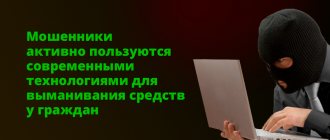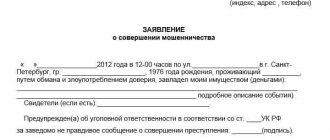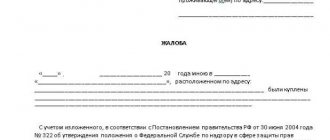Everyone is well aware of the existence of so-called inspections carried out by employees of economic security units.
You can carry out business activities for quite a long time and not encounter such problems. But what to do if you are interested? As a rule, this happens unexpectedly. In order to protect yourself from the negative consequences of inspections, you need to have information. When conducting inspections, employees of economic security units are guided by the Law of the Russian Federation of February 7, 2011 No. 3-FZ “On Police”, Federal Law of August 12, 1995 No. 144-FZ “On Operational-Investigative Activities”. The procedure for the implementation by employees of economic security units of operational support of criminal cases initiated on facts of violation of the legislation of the Russian Federation on taxes and fees is regulated in the Code of Criminal Procedure of the Russian Federation dated December 18, 2001 174-FZ.
Why OEBiPK?
The abbreviation OEBiPK stands for Department of Economic Security and Anti-Corruption . Previously, this body was called differently - OBEP (department for combating economic crimes). OEBiPK is a structural subdivision of the Ministry of Internal Affairs of the Russian Federation. The competence of the body includes the protection and protection of the economic security of the country.
According to paragraph 1 of Art. 40 of the Code of Criminal Procedure of the Russian Federation, OEBiPK refers to the bodies of inquiry. According to clause 1, part 3, art. 150 of the Code of Criminal Procedure of the Russian Federation, inquiries are carried out in criminal cases of crimes provided for in Part 1 of Art. 159 of the Criminal Code of the Russian Federation and Part 1 of specialized articles on fraud. That is, you need to contact OEBiPK in the case of the main, unqualified composition of Article 159 and in the case of unqualified compositions of specialized articles.
As for fraud as an administrative offense, the detectives (which include the employees of the Department of Economic Safety and Practical Affairs) have the right to draw up protocols on administrative offenses (clause 1.3.2 of Appendix No. 1 to the order of the Ministry of Internal Affairs of Russia dated August 30, 2017 No. 685) and make decisions on initiating a case against administrative offense.
Practical recommendations for inspection
Actions during OBEP inspections must fully comply with the norms of current legislation.
As a rule, an OBEP inspection is difficult to predict, but you can prepare for it. What needs to be done so that the OBEP check does not come as a complete surprise to you? Get your papers in order. Do not store “unnecessary information”.
The organization should store only those documents that relate to its activities. If there are warehouses, then foreign goods are a potential source of trouble during inspection by employees of economic security departments.
Organizations with retail trade must closely monitor the cash register and the issuance of checks, etc. Information not related to the company’s activities should not be stored either on the organization’s servers or computers. A minimum of unnecessary things means a minimum of questions when conducting an OBEP inspection.
Enterprise employees should know their rights in the event of OBEP inspections. When conducting an OBEP check, employees of the organization must communicate with the police superficially. It is necessary that in case of inspections, a person is present in the company who has the opportunity to give the necessary explanations regarding the economic activities of the organization. The competence of the person present during the inspection is a strong argument in your favor. And remember the golden rule - no one is obliged to testify against themselves or their immediate relatives; this right is enshrined in Article 51 of the Constitution.
Ask the inspection staff to present documents. Record information about the reviewers. It is advisable to clarify by telephone the authority of the persons who came to conduct the inspection on behalf of the Department of Economic Crimes. The telephone numbers of local economic security units should be at hand.
Then, employees of the organization must immediately notify company management.
When conducting an inspection, behave as politely and correctly as possible. You should not confront the police when conducting an inspection. Quite often, OBEP employees behave rudely. Do not succumb to emotional provocation; as a rule, this is one of the ways to emotionally influence those being tested.
Provide all requested documentation, open safes, premises, etc. Make sure that all seized documentation, etc. were reflected in the protocol of the OBEP inspection. If you have information classified by law as a trade secret of an enterprise, OBEP employees can seize it only with the permission of the prosecutor. However, you should not fight for such documents. You can always appeal illegal actions during an inspection. Remember, OBEP operatives can carry out procedural actions only in the presence of witnesses.
How to find the required OEBiPK?
Each city has its own division of this department. You can determine the required OESiPK for those living in a big city in the following way:
- find out which district the address where the applicant lives belongs to (this can be done using an Internet search engine or an address book);
- Type “police department” into an Internet search engine and then indicate the area.
As a rule, police departments have official websites where you can see whether the applicant's address belongs to this department or not. You can also call the department’s duty department and clarify whether you have decided to apply correctly.
How to compose a paper?
Each police department has a form with a sample crime report , which the applicant will be asked to fill out when applying (read about how to write a statement to the police regarding fraud here). But if you still decide to write a statement yourself, you need to remember the main requirement imposed by Article 141 of the Code of Criminal Procedure of the Russian Federation: a written statement about the crime must be signed by the applicant.
The Code of Criminal Procedure of the Russian Federation does not impose any other requirements for reporting a crime. Therefore, it is worth turning to the general requirements for a citizen’s appeal, enshrined in Article 7 of the Federal Law “On the procedure for considering appeals from citizens of the Russian Federation.” According to this article, the application must indicate:
- In the header of the document - the name of the authority to which the application is submitted (police department or ES&P department), the applicant’s data (full name, date of birth, address, telephone).
- The name of the document is “Statement of a crime” or “Statement of fraud.”
- In the text of the document, after the title, is the essence of the statement (the circumstances of the crime that occurred). After the presentation of the circumstances - the pleading part. B and point “1. Bring to criminal liability (full name of the guilty person, if known).”
- At the end, the following note is required: “You have been warned about criminal liability for knowingly false denunciation under Article 306 of the Criminal Code of the Russian Federation.”
- After the text - a list of evidence confirming the essence of the statement (screenshots of correspondence, video, audio recordings, etc.).
- At the bottom left after the list is the date of application.
- Below the date on the right is the applicant’s signature with a transcript.
For details on how to file a fraud report and where to submit it, read this material.
Schemes and persons involved in scams
Legal entities (credit fraud)
Legal entities are the subject of fraud most often when obtaining loans from a bank, using in this case entire criminal schemes.
To do this, representatives of the front legal entity create an imitation of the structure’s activities:
- register a new LLC or other business entity with a full set of relevant documentation;
- rent premises;
- create the appearance of money movement in accounts;
- they forge contracts, inflate their reputation, etc.
Identification of such complex and often extremely confusing schemes is the responsibility of the Department of Economic Crimes.
In fact, to begin such verification activities, no application is required, but most often the work of law enforcement officers begins after an official request from a bank representative.
The most striking example of recent years of fraud with legal entities is the theft at Sberbank of the Russian Federation (Meshchanskoe, Staromyskoe and Lublin branches). Losses as a result of illegal actions totaled more than 35 billion rubles. This amount was obtained as a result of issuing loans (2006-2007) using forged documents to legal entities and individuals. The specified employees of the enterprises in the loan agreements never worked in the specified structures. For successful lending, a whole package of fake documentation was prepared. After the loan was granted, the entire amount was transferred to the accounts of shell companies and then cashed out.
Individuals upon non-return of funds
Whether to submit an application in a case where the debtor does not return a certain amount of previously borrowed funds must be decided by everyone independently.
It all depends on what effect you want to achieve with your actions:
- Bring to criminal liability the person who committed fraudulent acts. In this case, contacting the Department of Economic Crimes is a reasonable and correct decision. Based on the evidence provided by you and collected by law enforcement agencies, a decision will be made to initiate criminal proceedings or refuse to initiate them. If a refusal is issued, the basis for this is often the existence of civil legal relations that are subject to resolution in court (civilian tribunal). In this case, appealing the decision of law enforcement officers will not lead to any result, but will only delay the conflict resolution procedure.
- Refund of money. In such a situation, it would be more appropriate to immediately resort to the help of a civilian tribunal, rather than turning to the Department of Economic Crimes. At the same time, you can send an application to a law enforcement agency for the purpose of conducting verification measures to determine whether there is fraud in the actions of the debtor. In this situation, this appeal may serve as a reason for a faster return of funds by the debtor in order to avoid criminal liability.
The best solution (whether to contact the Economic Crime Department or not) would be to consult a competent lawyer and explain to him all the circumstances of the case.
Officials
Officials in the Russian Federation often become subjects of a crime in the form of fraud. A textbook example of such a crime is the misappropriation of money by a person who promised to transfer it to a third party in the form of a bribe.
In this case, the application is submitted in the general manner, indicating the specific official who committed the crime.
Fraud has recently become a fairly common crime in the legal profession. A striking example of the dishonest activity of a lawyer is the verdict of the court of the N. region, where the relatives of the detained citizen E. and accused of committing a robbery with a weapon, as well as murder, decided to use the services of a lawyer who is quite “popular” and in demand in this region. The lawyer, who would later become accused under Article 159 of the Criminal Code of the Russian Federation, tried in every possible way to make the right impression: he named many names of officials, spoke familiarly about them, creating the impression of close relations with them.
Also, during a private conversation, the lawyer mentioned that everything can be resolved at certain prices established in the region. Relatives, wanting to save citizen E. and ease his fate, transferred the necessary amounts of money to the lawyer. The lawyer complained that he redirected the money to the necessary people, but they did not resolve the issue in the right direction, and repeatedly stated that the money was not enough. Despite the large sums received from relatives, E. was sentenced to 20 years in prison.
Relatives contacted law enforcement agencies with a statement about the lawyer’s dishonesty. As a result of the checks, it was revealed that the lawyer did not transfer any money to anyone, and it ended up in his bank accounts. It is not worth mentioning that persons who transfer money for bribes are also subject to criminal liability.
Another case of fraudulent actions by a lawyer is accepting a fee for representation in court, but not taking any measures to fulfill his duties due to heavy workload, unwillingness to perform them, or for other reasons.
What could be the evidence?
Article 74 of the Code of Criminal Procedure of the Russian Federation establishes a list of evidence in criminal proceedings. These include:
- testimony of the alleged attacker;
- testimony of the victim or witness;
- conclusion and testimony of an expert or specialist;
- evidence;
- protocols of investigative and judicial actions;
- other documents.
Article 26.2 of the Code of Administrative Offenses of the Russian Federation, in addition to those mentioned above, names:
- protocol on an administrative offense and other protocols in accordance with the Code of Administrative Offenses of the Russian Federation;
- explanations of the alleged offender;
- indications of special technical means.
Physical evidence is, for example, photographs, video and audio recordings, letters, checks, receipts and other paper media that indicate a criminal act.
You can view other tips and tricks on how to prove fraud here.
What is the review procedure?
After filing an application for fraud in the event of an administrative offense, an administrative offense case must be initiated. Within the meaning of Art. 28.7, the case must be initiated immediately after the fact of an administrative offense has been discovered .
A copy of the determination to initiate a case is sent within 24 hours or handed over to the applicant against receipt (clause 3.1 of Article 28.7 of the Code of Administrative Offenses of the Russian Federation). Next, the official conducts an administrative investigation, the duration of which is 1 month, in exceptional cases it can be extended to 6 (clause 5 of Article 28.7). Based on the results of the investigation, the following is issued:
- protocol on an administrative offense against the guilty person;
- a resolution to terminate the case of an administrative offense if nothing could be identified.
In criminal proceedings, an OEBiPK employee will check the report of a crime and make a decision on it no later than 3 days, the maximum extension period is no more than 30 days (clauses 1, 3 of Article 144 of the Code of Criminal Procedure of the Russian Federation). During verification activities, the detective must obtain explanations from the applicant, witnesses, and the attacker (if any), and examine the necessary evidence. Based on the results, the detective makes a decision:
- to initiate a criminal case;
- on the transfer of the case under jurisdiction (to another body);
- refusal to initiate criminal proceedings.
Where else can I apply?
In addition to filing a complaint with the Department of Economic Crimes, you can report fraud to the prosecutor's office. The decisions of the OEBiPK are also appealed there.
In addition, it makes sense to file a claim in civil court. The claim must demand the return of money stolen by fraud.
According to Article 44 of the Code of Criminal Procedure of the Russian Federation, you can appeal in court the decisions of the police and the prosecutor's office in a fraud case.
Is there a chance of getting my money back?
The applicant's chances of getting his money back, as practice shows, are practically negligible. This is due to the high complexity of such cases. Fraudsters are extremely difficult to identify; their accounts, telephone numbers, and addresses are registered to other people , and the stolen money is quickly withdrawn through exchange, purchase of goods, etc. As a rule, such offenses are interregional in nature. In this case, the investigation is hampered by the disunity of law enforcement agencies.
Some types of fraud are complex financial and technical frauds that require specialized knowledge to analyze and understand, which police officers often do not possess.
Application for searching for an employee
There are often situations when an employee does not show up for work and does not answer calls. At the same time, the employer cannot fire him, since it is unknown for what reason the person disappeared. If the reason is valid, for example, related to illness, then the dismissal will result in a lawsuit by the employee after his recovery.
If all attempts to find the employee at his place of residence are unsuccessful, the only option left is to search with the help of the police. The employer, along with the employee's relatives, has the right to submit a search application. If the person is not found, then it will be possible to declare the person missing (Article 42 of the Civil Code of the Russian Federation and Article 276 of the Code of Civil Procedure of the Russian Federation) and, after a court decision on the application, dismiss such an employee.
The application is drawn up in free form, but taking into account the requirements for any document of this kind. It is important to indicate in the text:
- The essence of the statement.
- Details of the wanted person.
- Circumstances of the disappearance.
- Information that the employee is not on vacation or sick leave, and has never been noted for absenteeism (or, conversely, has missed work before).
- Employer's address.
- List of attached documents.
- It is worth attaching to the application all documents that can help the investigation.
The case will be handled by the Department of Economic Crimes. Employees of this department have the right to inspect the premises of the employer's organization and seize documents necessary for the investigation.







